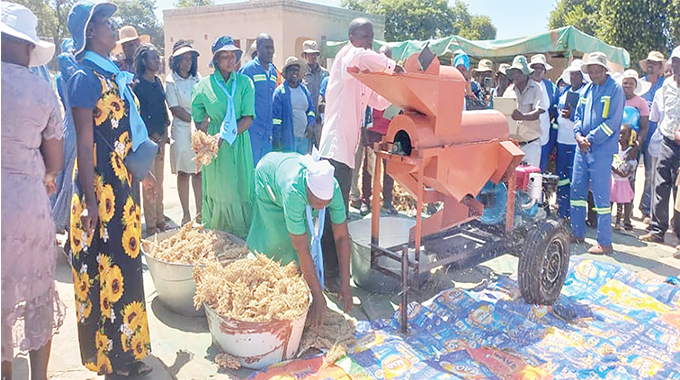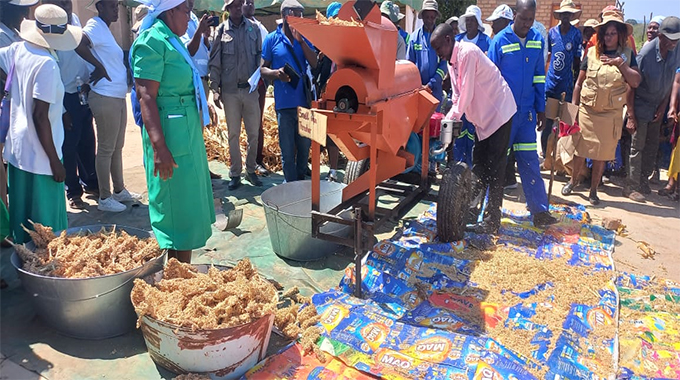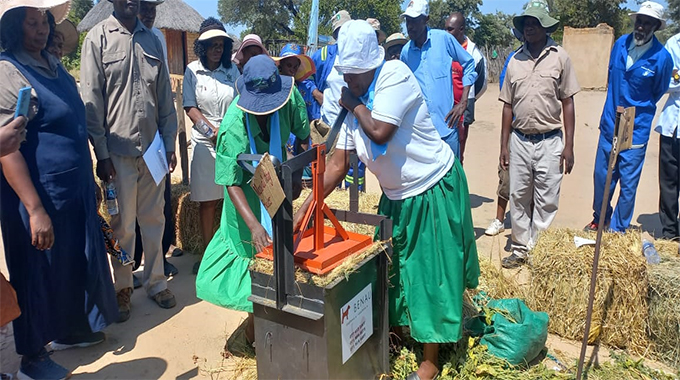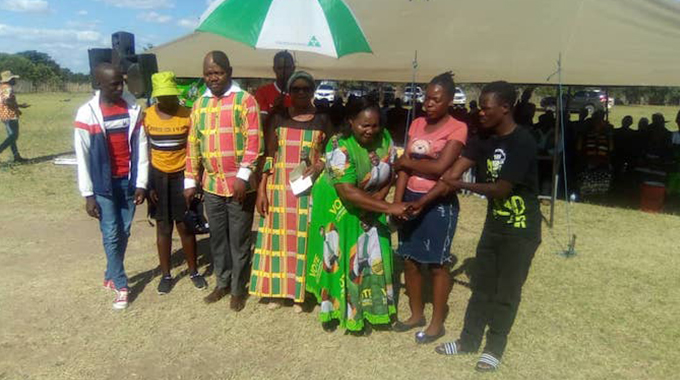Major boost for Vukuzenzele farmers

Sukulwenkosi Dube-Matutu, [email protected]
FARMING has become less cumbersome for Vukuzenzele farmers in Irisvale area, Umzingwane district in Matabeleland South, after farmers received equipment under the farmer field school concept as part of efforts to promote the adoption of smart agricultural practices among farmers.
The group, which has 44 members received a manual hay baling machine, small grain thrasher and grinding mill under the Building Climate Resilience of Vulnerable Agricultural Livelihoods in Southern Africa programme, which is being implemented by Government through the Ministry of Lands, Agriculture, Fisheries, Water and Rural Development in partnership with Green Climate Fund and the United Nations Development Programme (UNDP).
These inputs will support the farmers in growing traditional grains and preparing nutritive feed for their livestock. The farmers received the equipment in November last year.
Vukuzenzele Group is the first farmer field school that was established in Umzingwane under the project. The farmer field schools concept seeks to promote peer-to-peer learning.
Over 230 farmer field schools have been established under the programme.

A local farmer, Mrs Simangaliso Ndlovu said the manual hay baling machine has provided an easier way of making hay for their animals.
“We are livestock farmers and to sustain our herds of cattle, we have to prepare hay bales to feed animals. We used to make the hay bales in pits and it was laborious hence our work has been made easier with the hay baling machine,” she said.
“It’s quicker and we can produce bigger bales than before. To make hay bales we mainly use Lablab fodder, groundnut leaves and hay and these ingredients are available in our fields.”
Mrs Ndlovu said they harvest the ingredients when they are still fresh and rich in protein.

“We store them in a cool dry place to preserve nutrition. This way my animals will remain in good condition even during the drought period.”
Mrs Donaria Moyo said they are set to use the grain thrasher for the first time upon harvesting their crop.
She said their area is dry and requires them to produce traditional grains. Mrs Moyo said it has, however, been difficult to produce traditional grains because of the labour involved when thrashing manually.
“The grain thrasher will come in handy as it has been difficult to thrash manually. We used to take the whole day to thrash three 50kg bags of small grains while working as a group, but now, one person can process that amount of grain in a short space of time using this machine,” said Mrs Moyo.
“At the same time, while thrashing our small grains, the residue that comes out will go towards feeding our livestock. This machine won’t only benefit us as a group but we will also offer grain thrashing services to the community at a cost.”
Mrs Moyo said the grinding machine will help them to process maize and traditional grain stover to produce stock feed.

The farmers have also been engaged in the production of highly nutritive livestock feed in ammonification treatment pits using urea fertiliser, as part of efforts to sustain their animals in the face of climate change.
Vukuzenzele Group lead farmer, Mrs Elbina Machokoro said they established their group in 2014 as a village savings and lending group. She said they started a goat project using the money from savings.
Mrs Machokoro said they later ventured into farming projects. The group now has 44 members, with four members being lead farmers, each in charge of a group of 10 farmers.
Mrs Machokoro said they use the platform to acquire vast knowledge of modern farming methods and best farming practices with the assistance of extension workers.
“The equipment that we have received is a major boost for us as a group. It will increase our production levels and enhance our production of traditional grains and stock feed,” she said.
Irisvale village head, Mr Ezra Ncube said the production of traditional grains has saved communities from severe drought. He said the equipment they received would go a long way in assisting the community. — @DubeMatutu










Comments